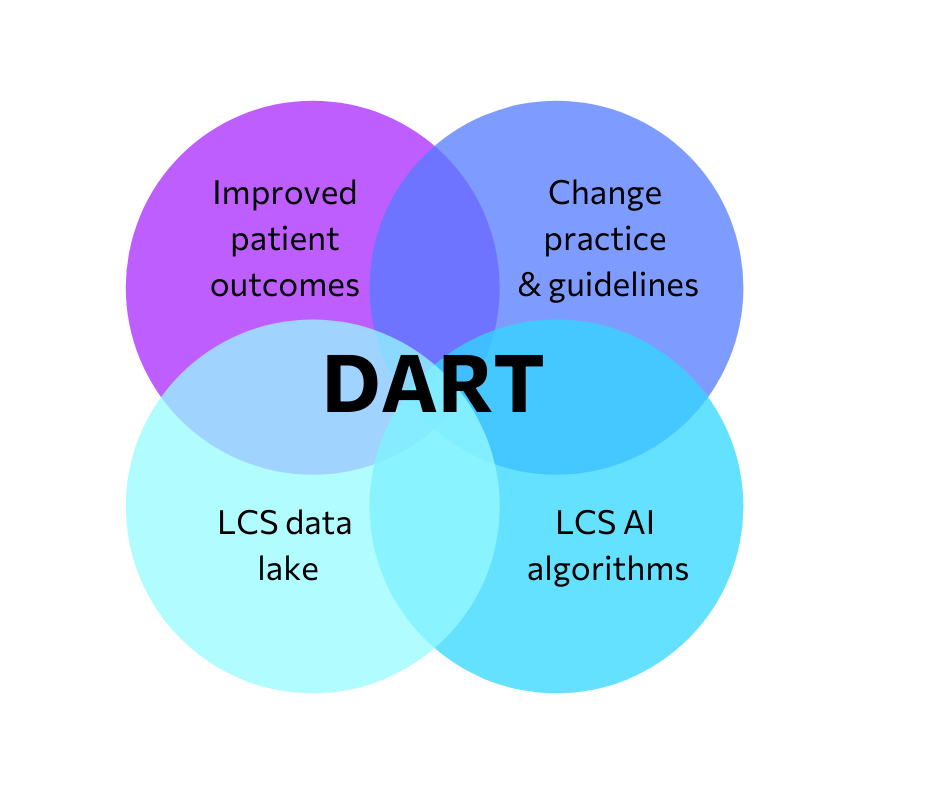Themes
Using data to improve patient treatment and outcomes
New and improved algorithms ensure better and earlier detection of lung nodules (small growths on the lung which can be benign or malignant), diagnosis of lung diseases and treatment options for patients. Large sets of data from Lung Health Checks mean artificial intelligence algorithms can be developed, validated and evaluated. Refined and validated algorithms will remove the need for lung biopsies, avoiding invasive procedures and saving lives.

Improved patient outcomes
Earlier and more accurate detection of lung cancer ensures earlier diagnosis and treatment. DART integrates patient history, CT nodule recognition software, digital pathology images, blood biomarker panel measurements and the QResearch score software for lung cancer screening.
Specific work includes:
- New COPD/CAD CT algorithms identify underlying health conditions which can be treated.
- Further developing the Optellum imaging prediction tool which produces
- Improved lung cancer detection rate
- Shorter duration from lung cancer referral to treatment
- Reduced false positive rate avoiding unnecessary patient anxiety
- Reduced number of investigation interventions saving lives, anxiety and NHS time and resources
Changed practice and guidelines
By gathering the evidence of who attends screening now, who benefits and why, DART is able to improve on who is invited to screening and how they are assessed- helping target the programme to the right people and optimising what support is given.
Specific work includes:
- Improved screening selection criteria and treatment paradigms so that patients receive the most appropriate treatments
- Integration of blood biomarkers using Roche’s blood protein biomarker test to improve diagnostic accuracy
- Improved methods to define lung nodules as malignant or benign, to address the current challenge with indeterminate diagnoses
- Quality assurance programme for radiologists to ensure that a high quality consistent screening service is provided across the country
Developing new outcome prediction models helps to improve the allocation of health care resource by using estimates of individual risk and benefits to target interventions to those most likely to benefit
Validated AI algorithms
New artificial intelligence based decision support tools are being developed and tested, to allow the clinical workforce to optimise detection and treatment decisions.
Specific work includes:
- An integrated digital pathology and radiology AI solution to improve CT categorisation of pulmonary nodules
- DART models predict outcomes in Lung Cancer Screening and early stage lung cancer
Data storage
The DART data systemstores DART data and links medical history, CT and digital pathology data data, which is accessible both by the DART programme partners as well as more broadly to national and international research teams.
The data collected in DART puts lung cancer screening at the forefront of AI research, and will be a unique international resource for future research about lung cancer detection and diagnosis.
Software and hardware solutions for data aggregation and algorithm deployment are provided by industrial partners (GEHC) and the NCIMI Innovate UK Centre of Excellence.
Process
All the work uses patient imaging data and related metadata collected during standard of care lung screening and care.
DART is being delivered by clinicians, academics and industrial partners working in a series of nine work packages.
A presentation giving an overview of the project can be downloaded here.